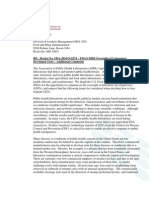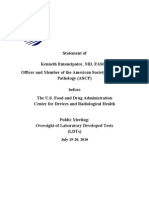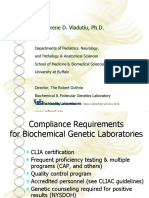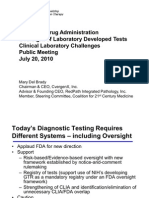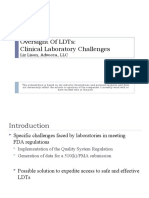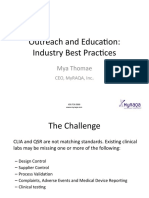0 ratings0% found this document useful (0 votes)
19 viewsLaboratory Developed Tests
Laboratory Developed Tests
Uploaded by
fdablogThis document discusses laboratory developed tests (LDTs) created by clinical genetic testing laboratories to diagnose rare genetic diseases. It notes that most genetic diseases are rare, and manufacturers have not developed tests for these due to small markets and high development costs. As a result, clinical genetic testing laboratories, which are CLIA-certified and adhere to standards, have developed tests to fill this need. However, increased regulatory requirements like GMP or 510(k) could significantly reduce viability of these laboratories and patient access to testing.
Copyright:
Attribution Non-Commercial (BY-NC)
Available Formats
Download as PPS, PDF, TXT or read online from Scribd
Laboratory Developed Tests
Laboratory Developed Tests
Uploaded by
fdablog0 ratings0% found this document useful (0 votes)
19 views10 pagesThis document discusses laboratory developed tests (LDTs) created by clinical genetic testing laboratories to diagnose rare genetic diseases. It notes that most genetic diseases are rare, and manufacturers have not developed tests for these due to small markets and high development costs. As a result, clinical genetic testing laboratories, which are CLIA-certified and adhere to standards, have developed tests to fill this need. However, increased regulatory requirements like GMP or 510(k) could significantly reduce viability of these laboratories and patient access to testing.
Original Title
FDA-2010-N-0274-0053.1
Copyright
© Attribution Non-Commercial (BY-NC)
Available Formats
PPS, PDF, TXT or read online from Scribd
Share this document
Did you find this document useful?
Is this content inappropriate?
This document discusses laboratory developed tests (LDTs) created by clinical genetic testing laboratories to diagnose rare genetic diseases. It notes that most genetic diseases are rare, and manufacturers have not developed tests for these due to small markets and high development costs. As a result, clinical genetic testing laboratories, which are CLIA-certified and adhere to standards, have developed tests to fill this need. However, increased regulatory requirements like GMP or 510(k) could significantly reduce viability of these laboratories and patient access to testing.
Copyright:
Attribution Non-Commercial (BY-NC)
Available Formats
Download as PPS, PDF, TXT or read online from Scribd
Download as pps, pdf, or txt
0 ratings0% found this document useful (0 votes)
19 views10 pagesLaboratory Developed Tests
Laboratory Developed Tests
Uploaded by
fdablogThis document discusses laboratory developed tests (LDTs) created by clinical genetic testing laboratories to diagnose rare genetic diseases. It notes that most genetic diseases are rare, and manufacturers have not developed tests for these due to small markets and high development costs. As a result, clinical genetic testing laboratories, which are CLIA-certified and adhere to standards, have developed tests to fill this need. However, increased regulatory requirements like GMP or 510(k) could significantly reduce viability of these laboratories and patient access to testing.
Copyright:
Attribution Non-Commercial (BY-NC)
Available Formats
Download as PPS, PDF, TXT or read online from Scribd
Download as pps, pdf, or txt
You are on page 1of 10
Laboratory Developed Tests
Kathleen W. Rao, PhD
Professor of Pediatrics, Pathology and
Laboratory Medicine, and Genetics
Director, Cytogenetics Laboratory
UNC-Chapel Hill
Member, Board of Directors
American College of Medical Genetics
ACMG
The American College of Medical
Genetics (ACMG) is a professional
organization composed of biochemical,
clinical, cytogenetic, medical and
molecular geneticists, genetic
counselors and other health care
professionals committed to the practice
of medical genetics.
Fellows of the College are doctoral level
physicians and clinical scientists who
are Board Certified in one or more areas
of clinical or laboratory genetics practice
by the American Board of Medical
Genetics (ABMG), an American Board of
Medical Specialties (ABMS) Board
The GeneTests website (hosted by
NCBI) currently lists 1850 genetic
diseases for which diagnostic testing is
available
Most genetic diseases fall into the
category of rare or ultra rare diseases
With a few exceptions, manufacturers have
not developed and marketed testing
reagents for use in diagnosing these
rare/ultra rare diseases
Financial incentives for developing reagents
and performing clinical trials are not
available to offset the high cost of GMP and
the 510K/PMA process and small potential
markets
This has left the task of developing
tests for the majority of genetic
diseases to the high complexity CLIA-
certified genetic testing laboratories
(Clinical Genetic Testing Laboratories)
Clinical Genetic Testing Laboratories
Are directed by Board Certified doctoral level
clinical scientists
They participate in Proficiency Testing and
rigorous laboratory accreditation programs
through CLIA, CLIA-exempt states, and its
deemed organizations
Adhere to CLIA mandated standards and
professional laboratory guidelines published
by organizations like ACMG
Many of these laboratories exist in major
medical centers and serve the most severely
affected patients and most vulnerable
populations
The financial burden of requiring these
laboratories to meet GMP and/or 510K/PMA
requirements (e.g. clinical trials) in addition to
their current regulatory requirements would
significantly reduce both the viability of many
of these laboratories and access to testing for
patients
Potential negative consequences to increased
regulatory requirements
Closure of some/many medical-center Clinical
Genetic Testing Laboratories and loss of
training sites for future laboratory directors
Inability to bring new tests online
Loss of access to testing because of increased
costs and scarce resources
Reduction of quality of care because of less
opportunity for collaboration between
laboratories and clinicians and less
competition between laboratories
(CLIA-certified) Clinical Genetic Testing
Laboratories have served this patient
population well
We believe that our patients are best
served by taking the least burdensome
approach to regulatory oversight of
these laboratories
You might also like
- ASCP BOC Study-Guide 5e ContentsDocument12 pagesASCP BOC Study-Guide 5e ContentsJoe Devola25% (4)
- Lot To Lot VariationDocument22 pagesLot To Lot VariationAwais Ahmad100% (1)
- PDHPE HSC Revision Questions 2010-18Document83 pagesPDHPE HSC Revision Questions 2010-18Jusnoor KAURNo ratings yet
- Association For Molecular PathologyDocument4 pagesAssociation For Molecular PathologyfdablogNo ratings yet
- Don Yager DHSC, Pa-C, MT (Ascp)Document46 pagesDon Yager DHSC, Pa-C, MT (Ascp)pleja18No ratings yet
- Pan American Society For Clinical Virology Position Statement On Fda Oversight of Laboratory-Developed Tests (LDTS)Document5 pagesPan American Society For Clinical Virology Position Statement On Fda Oversight of Laboratory-Developed Tests (LDTS)fdablogNo ratings yet
- FDA Public Meeting On Laboratory Developed Tests July 19, 2010Document3 pagesFDA Public Meeting On Laboratory Developed Tests July 19, 2010fdablogNo ratings yet
- CDC Good Laboratory Practices For Molecular Genetic Testing For Heritable DiseasesDocument41 pagesCDC Good Laboratory Practices For Molecular Genetic Testing For Heritable DiseasesRodolfo VelazcoNo ratings yet
- Who Is CAMLT?: Career OpportunitiesDocument2 pagesWho Is CAMLT?: Career OpportunitiesGabriel OrdoñezNo ratings yet
- Medical Laboratory ScientistDocument7 pagesMedical Laboratory ScientistChandraNo ratings yet
- A Review of Medical Errors in Laboratory Diagnostics and Where We Are TodayDocument4 pagesA Review of Medical Errors in Laboratory Diagnostics and Where We Are TodayShahid HussainNo ratings yet
- FDA Oversight of Laboratory Developed Tests Docket Number FDA-2010-N-0274Document2 pagesFDA Oversight of Laboratory Developed Tests Docket Number FDA-2010-N-0274fdablogNo ratings yet
- Bertholf2017 Chapter LaboratoryStructureAndFunctionDocument23 pagesBertholf2017 Chapter LaboratoryStructureAndFunctionci8084102No ratings yet
- What Is Lab AdvantageDocument3 pagesWhat Is Lab Advantageendale gebregzabherNo ratings yet
- RE: Docket No. FDA-2010-N-0274 - FDA/CDRH Oversight of Laboratory Developed Tests - Additional CommentsDocument3 pagesRE: Docket No. FDA-2010-N-0274 - FDA/CDRH Oversight of Laboratory Developed Tests - Additional CommentsfdablogNo ratings yet
- Georgirene D. Vladutiu, PH.DDocument9 pagesGeorgirene D. Vladutiu, PH.DfdablogNo ratings yet
- Rauch 2007Document14 pagesRauch 2007fioravantipamela1321No ratings yet
- A Review of Medical Errors in Laboratory Diagnostics and Where We Are TodayDocument4 pagesA Review of Medical Errors in Laboratory Diagnostics and Where We Are TodaytaghamdNo ratings yet
- What Happens To My Blood SampleDocument52 pagesWhat Happens To My Blood SamplegsaldadzeNo ratings yet
- Paper Reports 2Document12 pagesPaper Reports 2Ihsan UllahNo ratings yet
- Chair, Department of Laboratory Medicine and Pathology, Mayo Clinic President and Chief Executive Officer, Mayo Medical LaboratoriesDocument2 pagesChair, Department of Laboratory Medicine and Pathology, Mayo Clinic President and Chief Executive Officer, Mayo Medical LaboratoriesfdablogNo ratings yet
- Informed Consent FormDocument3 pagesInformed Consent FormNazaqat FarooqNo ratings yet
- Clinical LaboratoryDocument2 pagesClinical LaboratoryEull Jay GuevaraNo ratings yet
- Validacion PCR COVID 19Document11 pagesValidacion PCR COVID 19Rodolfo VelazcoNo ratings yet
- July 19-20, 2010Document3 pagesJuly 19-20, 2010fdablogNo ratings yet
- Erdal-2017-The Economic Impact of Poor SampleDocument10 pagesErdal-2017-The Economic Impact of Poor SampleGökhanNo ratings yet
- Clinical Laboratory Tests - Which, Why, and What Do The Results Mean? - LaboratorDocument34 pagesClinical Laboratory Tests - Which, Why, and What Do The Results Mean? - LaboratorGeorgeNo ratings yet
- Estandar VariantesDocument38 pagesEstandar VariantesCLARA INES SANCHEZ PERAFANNo ratings yet
- A Medical Lab TechnologistDocument9 pagesA Medical Lab TechnologistHazizah Ujang0% (1)
- Lab Scope of ServicesDocument10 pagesLab Scope of Servicessabir osmanNo ratings yet
- FDA/CDHR Public Meeting: Oversight of Laboratory Developed Tests (Direct-to-Consumer Testing)Document9 pagesFDA/CDHR Public Meeting: Oversight of Laboratory Developed Tests (Direct-to-Consumer Testing)fdablogNo ratings yet
- PGX TestingDocument51 pagesPGX TestingHashim KhanNo ratings yet
- FDA 510 (K) Whole Power PDFDocument2 pagesFDA 510 (K) Whole Power PDFAlvaro SanchezNo ratings yet
- Georgirene D. Vladutiu, PH.DDocument8 pagesGeorgirene D. Vladutiu, PH.DfdablogNo ratings yet
- QC in Lab ChapterDocument10 pagesQC in Lab ChapterSasabilNo ratings yet
- Pharmaceutical Sciences: Frequency of Pre-Analytical Phase Errors in A Clinical Chemistry LaboratoryDocument4 pagesPharmaceutical Sciences: Frequency of Pre-Analytical Phase Errors in A Clinical Chemistry LaboratoryAyesha MehmoodNo ratings yet
- Textbook of Urgent Care Management: Chapter 32, Implementation of a Moderate-Complexity Clinical LaboratoryFrom EverandTextbook of Urgent Care Management: Chapter 32, Implementation of a Moderate-Complexity Clinical LaboratoryNo ratings yet
- TCC Adriana Barros MontelDocument16 pagesTCC Adriana Barros MontelEma DieselNo ratings yet
- 483531a PDFDocument3 pages483531a PDFcontact4079No ratings yet
- Clinical Laboratory Scientist/Medical Technologist of The Future Task ListDocument3 pagesClinical Laboratory Scientist/Medical Technologist of The Future Task Listaiai100% (1)
- Excellence Pathology Laboratory Medicine: - . - Fostering and Advocating in The Practice of and WorldwideDocument2 pagesExcellence Pathology Laboratory Medicine: - . - Fostering and Advocating in The Practice of and WorldwideAmit BiswasNo ratings yet
- A Review of Medical Errors in Laboratory Diagnostics and Where We Are TodayDocument7 pagesA Review of Medical Errors in Laboratory Diagnostics and Where We Are TodayRobert MaynardNo ratings yet
- Analysis of Laboratory Critical Value Reporting at A Large Academic Medical CenterDocument7 pagesAnalysis of Laboratory Critical Value Reporting at A Large Academic Medical CenterLevi GasparNo ratings yet
- Sample of TranslationDocument5 pagesSample of Translationmartabak_polkadotNo ratings yet
- EFLM WG Preanalytical Phase Opinion Paper Local Validation of Blood Collection Tubes in Clinical LaboratoriesDocument7 pagesEFLM WG Preanalytical Phase Opinion Paper Local Validation of Blood Collection Tubes in Clinical LaboratoriesSiskawati SuparminNo ratings yet
- JCTLM Global ApproachDocument9 pagesJCTLM Global ApproachElena ShcherbakovaNo ratings yet
- Critical Result ReportingDocument9 pagesCritical Result ReportingSafiqulatif AbdillahNo ratings yet
- An Assessment of Acceptance of Results Generated by Clinical Laboratories in MandevilleDocument16 pagesAn Assessment of Acceptance of Results Generated by Clinical Laboratories in MandevilleFabian PitkinNo ratings yet
- Preparing To Take TheDocument27 pagesPreparing To Take TheHussein MOUSSANo ratings yet
- GCLPDocument116 pagesGCLPLordie Jordan Nalus100% (1)
- Archives: Low-Volume Analyzers: Growing Menus, More ConsolidationDocument11 pagesArchives: Low-Volume Analyzers: Growing Menus, More ConsolidationherbertamayaNo ratings yet
- External Quality Assessment in Resource-Limited CoDocument14 pagesExternal Quality Assessment in Resource-Limited CoEben Leonel Albano MaiopueNo ratings yet
- Regulated Bioanalytical Laboratories: Technical and Regulatory Aspects from Global PerspectivesFrom EverandRegulated Bioanalytical Laboratories: Technical and Regulatory Aspects from Global PerspectivesNo ratings yet
- TH THDocument2 pagesTH THfdablogNo ratings yet
- What Are Clinical TechnologistsDocument5 pagesWhat Are Clinical TechnologistsKhanyi MalingaNo ratings yet
- Critical Value ReportingDocument7 pagesCritical Value Reportingjorguey100% (1)
- ClinicalLaboratory StatPearls NCBIBookshelfDocument1 pageClinicalLaboratory StatPearls NCBIBookshelfmpeterdaminsetNo ratings yet
- Article StandardsandGuidelinesACMGDocument21 pagesArticle StandardsandGuidelinesACMGJuan Nezaret Baez LujanNo ratings yet
- Clinical Scientist Trainee Immunopathology PDDocument4 pagesClinical Scientist Trainee Immunopathology PDJulia BeanNo ratings yet
- Code of Practice and GuidanceDocument3 pagesCode of Practice and Guidance0little.army0No ratings yet
- Quality Control Recommendations and Procedures For in Clinical LaboratoriesDocument8 pagesQuality Control Recommendations and Procedures For in Clinical Laboratoriesvitalab llanograndeNo ratings yet
- Comments On Regulating LDTDocument2 pagesComments On Regulating LDTfdablogNo ratings yet
- Agendia - Dr. Bernhard Sixt, CeoDocument1 pageAgendia - Dr. Bernhard Sixt, CeofdablogNo ratings yet
- Small Business Developed Innovative Tests: A Proposed Regulatory Exemption ForDocument4 pagesSmall Business Developed Innovative Tests: A Proposed Regulatory Exemption ForfdablogNo ratings yet
- FDA/CDHR Public Meeting: Oversight of Laboratory Developed Tests (Direct-to-Consumer Testing)Document9 pagesFDA/CDHR Public Meeting: Oversight of Laboratory Developed Tests (Direct-to-Consumer Testing)fdablogNo ratings yet
- Chair, Department of Laboratory Medicine and Pathology, Mayo Clinic President and Chief Executive Officer, Mayo Medical LaboratoriesDocument2 pagesChair, Department of Laboratory Medicine and Pathology, Mayo Clinic President and Chief Executive Officer, Mayo Medical LaboratoriesfdablogNo ratings yet
- Mary Del Brady Chairman & Ceo, Cvergenx, Inc. Advisor & Founding Ceo, Redpath Integrated Pathology, Inc. Member, Steering Committee, Coalition For 21 Century MedicineDocument4 pagesMary Del Brady Chairman & Ceo, Cvergenx, Inc. Advisor & Founding Ceo, Redpath Integrated Pathology, Inc. Member, Steering Committee, Coalition For 21 Century MedicinefdablogNo ratings yet
- Fda 2010 N 0274 0060.1Document2 pagesFda 2010 N 0274 0060.1fdablogNo ratings yet
- Georgirene D. Vladutiu, PH.DDocument8 pagesGeorgirene D. Vladutiu, PH.DfdablogNo ratings yet
- About Genomic Health, Inc.: Genomic Health Is Committed To Prolonging and Enhancing The Lives of Patients With CancerDocument7 pagesAbout Genomic Health, Inc.: Genomic Health Is Committed To Prolonging and Enhancing The Lives of Patients With CancerfdablogNo ratings yet
- Opening RemarksDocument3 pagesOpening RemarksfdablogNo ratings yet
- FDA/CDRH Public Meeting: Oversight of Laboratory Developed Tests - Patient ConsiderationsDocument8 pagesFDA/CDRH Public Meeting: Oversight of Laboratory Developed Tests - Patient ConsiderationsfdablogNo ratings yet
- From: To: Date: SubjectDocument4 pagesFrom: To: Date: SubjectfdablogNo ratings yet
- Georgirene D. Vladutiu, PH.DDocument9 pagesGeorgirene D. Vladutiu, PH.DfdablogNo ratings yet
- Oversight of LDTS: Clinical Laboratory Challenges: Liz Lison, Advocea, LLCDocument9 pagesOversight of LDTS: Clinical Laboratory Challenges: Liz Lison, Advocea, LLCfdablogNo ratings yet
- Outreach and Education: Industry Best Practices: Mya ThomaeDocument11 pagesOutreach and Education: Industry Best Practices: Mya ThomaefdablogNo ratings yet
- RE: Docket No. FDA-2010-N-0274 - FDA/CDRH Oversight of Laboratory Developed Tests - Additional CommentsDocument3 pagesRE: Docket No. FDA-2010-N-0274 - FDA/CDRH Oversight of Laboratory Developed Tests - Additional CommentsfdablogNo ratings yet
- Appropriateness For Ldts Companion DX Assays: Perspectives On To Be Used AsDocument16 pagesAppropriateness For Ldts Companion DX Assays: Perspectives On To Be Used AsfdablogNo ratings yet
- FDA Oversight of Laboratory Developed Tests Docket Number FDA-2010-N-0274Document2 pagesFDA Oversight of Laboratory Developed Tests Docket Number FDA-2010-N-0274fdablogNo ratings yet
- TH THDocument2 pagesTH THfdablogNo ratings yet
- July 19-20, 2010Document3 pagesJuly 19-20, 2010fdablogNo ratings yet
- Fda Regulation: Lab Developed Tests (LDTS) : Ted SnelgroveDocument6 pagesFda Regulation: Lab Developed Tests (LDTS) : Ted SnelgrovefdablogNo ratings yet
- ID4013 - SPW103 - Assessment - 2 - Response Template - 230321 2Document20 pagesID4013 - SPW103 - Assessment - 2 - Response Template - 230321 2SUCHETA DASNo ratings yet
- Extension Function of HEIsDocument14 pagesExtension Function of HEIsJuvy MojaresNo ratings yet
- Ncp-Proper Sonia FinalDocument4 pagesNcp-Proper Sonia FinalSoniaMarieBalanayNo ratings yet
- Effectiveness of Back Massage On Pain Relief During FirstDocument6 pagesEffectiveness of Back Massage On Pain Relief During FirstFatmawati IdrusNo ratings yet
- Draft For Argumentative Essay-9th FINALDocument2 pagesDraft For Argumentative Essay-9th FINALMajo LCNo ratings yet
- Canterbury Maud BrochureDocument2 pagesCanterbury Maud BrochureadavesarNo ratings yet
- Brochure of Gian Sagar College of Nursing, PatialaDocument4 pagesBrochure of Gian Sagar College of Nursing, Patialamrinal sahooNo ratings yet
- City Assessor of Cebu v. Association of Benevola de CebuDocument13 pagesCity Assessor of Cebu v. Association of Benevola de CebuSamantha De GuzmanNo ratings yet
- SunbordDocument4 pagesSunbordManu Priya Tyagi SaraswatNo ratings yet
- Trends in Development of Nursing Education in IndiaDocument22 pagesTrends in Development of Nursing Education in IndiaAthira PS100% (1)
- VistA - HMIS by Dr. Saurabh LadhaDocument35 pagesVistA - HMIS by Dr. Saurabh LadhaSaurav_Rules_1703No ratings yet
- GOSODocument3 pagesGOSOHoney Bee S. PlatolonNo ratings yet
- MODULE 3: Kangaroo Mother CareDocument11 pagesMODULE 3: Kangaroo Mother CareKristina BurburanNo ratings yet
- Psyche December ExposureDocument3 pagesPsyche December ExposureRohanisa AdapNo ratings yet
- Lassic Rticle: Clinical Assessment of Vertical DimensionDocument5 pagesLassic Rticle: Clinical Assessment of Vertical DimensionAllan GarciaNo ratings yet
- Traditional Chinese Medicine For Treatment of FibromyalgiaDocument14 pagesTraditional Chinese Medicine For Treatment of FibromyalgiaMiki ShimizuNo ratings yet
- The Vision, Mission and Core Values of The Institution: - o o o - o oDocument23 pagesThe Vision, Mission and Core Values of The Institution: - o o o - o oYvonne de ChavezNo ratings yet
- Commentary: Iron Deficiency of Pregnancy - A New Approach Involving Intravenous IronDocument7 pagesCommentary: Iron Deficiency of Pregnancy - A New Approach Involving Intravenous IronRaluca StaiculescuNo ratings yet
- 6 Cognitive Behavioral Therapy Techniques For Bipolar DisorderDocument7 pages6 Cognitive Behavioral Therapy Techniques For Bipolar Disorderprabha50% (2)
- Kenya HRH Strategy 2014 2018Document82 pagesKenya HRH Strategy 2014 2018Isaac SpaiderNo ratings yet
- Dear MR Shamsi Vuai NahodhaDocument2 pagesDear MR Shamsi Vuai NahodhaShamsi NahodhaNo ratings yet
- ECard - PDF MediclameDocument2 pagesECard - PDF MediclameNILESH PATILNo ratings yet
- Request LetterDocument2 pagesRequest Lettermail2navaskvNo ratings yet
- Final Projected-requirements-for-barangay-health-facilities-JearelDocument2 pagesFinal Projected-requirements-for-barangay-health-facilities-JearelMarch Nuel ChiongsonNo ratings yet
- Marketing Practices of Indian Medical Tourism-A Review: SangeetaDocument10 pagesMarketing Practices of Indian Medical Tourism-A Review: Sangeetaavijitcu2007No ratings yet
- Assessment of Fundamental Knowledge 2013Document10 pagesAssessment of Fundamental Knowledge 2013Jason PakNo ratings yet
- Broad Purpose Professional AssociationsDocument3 pagesBroad Purpose Professional AssociationsShehina MuhammadNo ratings yet
- Organogram HealthDocument9 pagesOrganogram HealthMannat RiarNo ratings yet
- Lec 6 Family Health AssessmentDocument7 pagesLec 6 Family Health AssessmentEda Mae FernandezNo ratings yet














